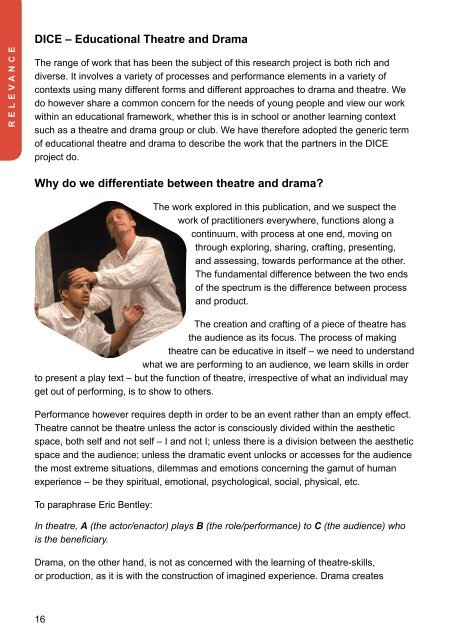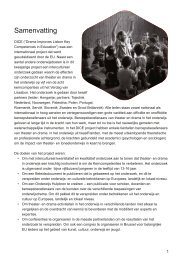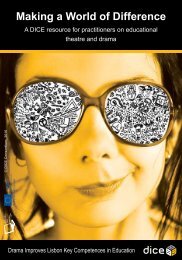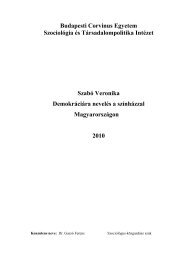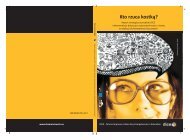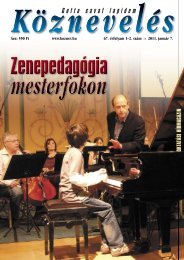Policy Paper - Drama Improves Lisbon Key Competences in Education
Policy Paper - Drama Improves Lisbon Key Competences in Education
Policy Paper - Drama Improves Lisbon Key Competences in Education
Create successful ePaper yourself
Turn your PDF publications into a flip-book with our unique Google optimized e-Paper software.
Relevance<br />
DICE – <strong>Education</strong>al Theatre and <strong>Drama</strong><br />
The range of work that has been the subject of this research project is both rich and<br />
diverse. It <strong>in</strong>volves a variety of processes and performance elements <strong>in</strong> a variety of<br />
contexts us<strong>in</strong>g many different forms and different approaches to drama and theatre. We<br />
do however share a common concern for the needs of young people and view our work<br />
with<strong>in</strong> an educational framework, whether this is <strong>in</strong> school or another learn<strong>in</strong>g context<br />
such as a theatre and drama group or club. We have therefore adopted the generic term<br />
of educational theatre and drama to describe the work that the partners <strong>in</strong> the DICE<br />
project do.<br />
Why do we differentiate between theatre and drama?<br />
The work explored <strong>in</strong> this publication, and we suspect the<br />
work of practitioners everywhere, functions along a<br />
cont<strong>in</strong>uum, with process at one end, mov<strong>in</strong>g on<br />
through explor<strong>in</strong>g, shar<strong>in</strong>g, craft<strong>in</strong>g, present<strong>in</strong>g,<br />
and assess<strong>in</strong>g, towards performance at the other.<br />
The fundamental difference between the two ends<br />
of the spectrum is the difference between process<br />
and product.<br />
The creation and craft<strong>in</strong>g of a piece of theatre has<br />
the audience as its focus. The process of mak<strong>in</strong>g<br />
theatre can be educative <strong>in</strong> itself – we need to understand<br />
what we are perform<strong>in</strong>g to an audience, we learn skills <strong>in</strong> order<br />
to present a play text – but the function of theatre, irrespective of what an <strong>in</strong>dividual may<br />
get out of perform<strong>in</strong>g, is to show to others.<br />
Performance however requires depth <strong>in</strong> order to be an event rather than an empty effect.<br />
Theatre cannot be theatre unless the actor is consciously divided with<strong>in</strong> the aesthetic<br />
space, both self and not self – I and not I; unless there is a division between the aesthetic<br />
space and the audience; unless the dramatic event unlocks or accesses for the audience<br />
the most extreme situations, dilemmas and emotions concern<strong>in</strong>g the gamut of human<br />
experience – be they spiritual, emotional, psychological, social, physical, etc.<br />
To paraphrase Eric Bentley:<br />
In theatre, A (the actor/enactor) plays B (the role/performance) to C (the audience) who<br />
is the beneficiary.<br />
<strong>Drama</strong>, on the other hand, is not as concerned with the learn<strong>in</strong>g of theatre-skills,<br />
or production, as it is with the construction of imag<strong>in</strong>ed experience. <strong>Drama</strong> creates<br />
dramatic situations to be explored by the participants, <strong>in</strong>vit<strong>in</strong>g them to f<strong>in</strong>d out more<br />
about the process of how the situation comes <strong>in</strong>to be<strong>in</strong>g, to shift perspectives <strong>in</strong> the<br />
here and now, identify and sometimes solve problems and deepen our understand<strong>in</strong>g<br />
of them. The focus is on process: it is a social activity that relies on many voices and<br />
perspectives, and on role-tak<strong>in</strong>g; that focuses on task rather than <strong>in</strong>dividual <strong>in</strong>terests; and<br />
that enables participants to see with new eyes. This approach creates an opportunity to<br />
probe concepts, issues and problems central to the human condition, and builds space<br />
for reflection to ga<strong>in</strong> new knowledge about the world. <strong>Drama</strong> is more concerned with<br />
provid<strong>in</strong>g the child with lived-through experience, with the enactive moment, rather than<br />
with perform<strong>in</strong>g the rehearsed moment. It moves along an educational cont<strong>in</strong>uum that<br />
embraces many forms, from simple role play that is very close to child’s play to fullystructured<br />
shar<strong>in</strong>g (<strong>in</strong>clud<strong>in</strong>g show<strong>in</strong>g); but the focus rema<strong>in</strong>s on identify<strong>in</strong>g opportunities<br />
for learn<strong>in</strong>g and how to organise these.<br />
In drama, A (the actor/enactor) is simultaneously B (role) and<br />
C (audience), through participation and observation, <strong>in</strong> a<br />
process of percipience (a process of both observ<strong>in</strong>g<br />
and participat<strong>in</strong>g).<br />
<strong>Education</strong>ally speak<strong>in</strong>g, some of our work tra<strong>in</strong>s<br />
young people <strong>in</strong> theatre and drama skills <strong>in</strong> order<br />
that they can perform <strong>in</strong> theatre or pass those<br />
skills on to others through teach<strong>in</strong>g. But there is<br />
also a deeper concern and a wider potential <strong>in</strong><br />
educational theatre and drama: to use dramatic art<br />
to connect thought and feel<strong>in</strong>g so that young people<br />
can explore and reflect subject matter, test and try out new<br />
ideas, acquire new knowledge, create new values, and build selfefficacy<br />
and self-esteem.<br />
A.3. What are the <strong>Key</strong> <strong>Competences</strong>?<br />
“<strong>Key</strong> competences <strong>in</strong> the shape of knowledge, skills and attitudes appropriate to each<br />
context are fundamental for each <strong>in</strong>dividual <strong>in</strong> a knowledge-based society. They provide<br />
added value for the labour market, social cohesion and active citizenship by offer<strong>in</strong>g<br />
flexibility and adaptability, satisfaction and motivation. Because they should be acquired<br />
by everyone, this Recommendation proposes a reference tool for the Member States<br />
to ensure that these key competences are fully <strong>in</strong>tegrated <strong>in</strong>to their strategies and<br />
<strong>in</strong>frastructures, particularly <strong>in</strong> the context of lifelong learn<strong>in</strong>g.”<br />
Relevance<br />
16<br />
17


